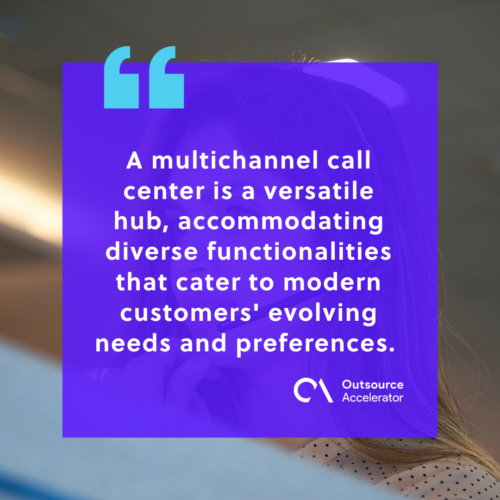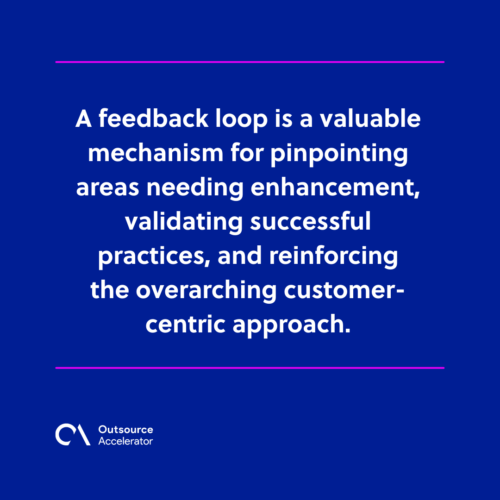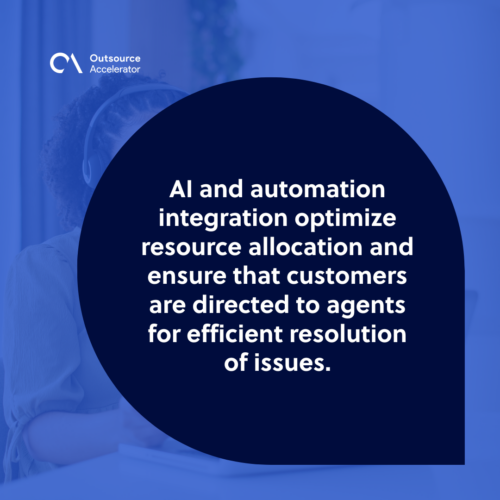Multichannel call center: Functionalities and requirements

Multichannel call centers nowadays are established by companies as a strategic response to modern consumers’ changing preferences and expectations.
Unlike traditional call centers that predominantly rely on telephone communication, multichannel call centers offer diverse communication avenues.
In fact, 44% of businesses claim to provide four or more communication channels with clients. This allows customers to interact through their preferred channels: phone calls, emails, social media platforms, and video conferencing.
A fundamental change in consumer behavior drives the shift towards multiple channels for communication. Firms can cater to consumers’ varied needs and preferences through these channels, ensuring customers can engage on their terms.
This enhanced flexibility is a significant draw, as it recognizes that consumers are not one-size-fits-all entities. Each customer is unique and may feel more comfortable using different communication modes.
Moreover, multichannel call centers provide a seamless communication experience. Customers can start a conversation on one platform and seamlessly transition to another without losing context.
This continuity fosters a sense of connectivity and demonstrates the firm’s commitment to addressing customer needs comprehensively.
Functionalities of multichannel call center
A multichannel call center is a versatile hub, accommodating diverse functionalities that cater to modern customers’ evolving needs and preferences.
When communication extends beyond traditional phone calls, these centers have expanded their scope to encompass various modes of interaction.
In other words, multichannel call centers are redefining how businesses engage with their clientele.

Here are the significant functionalities of a multichannel call center:
Handling phone calls
While digital communication methods have surged in popularity, the significance of phone calls as a direct and personal means of interaction remains undeniable.
Multichannel call centers expertly manage both inbound and outbound calls, leveraging interactive voice response (IVR) systems to guide callers to the most appropriate agents.
This approach ensures that customers can promptly connect with a live representative, enhancing the human touch of the service.
The availability of phone communication within a multichannel context reaffirms the center’s commitment to customer preferences and enriches the overall customer experience.
Managing emails
Email, a steadfast mode of business communication, retains its relevance in the multichannel landscape. Multichannel call centers adeptly streamline email management by categorizing, prioritizing, and skillfully routing emails to specialized agents.
The integration of automation tools further optimizes the process, enabling the preliminary drafting of responses and consequently saving time.
Social media interactions
The pervasive influence of social media platforms necessitates proactive business engagement. Multichannel call centers effectively incorporate social media management, enabling agents to do the following:
- Vigilantly monitor brand mentions
- Respond promptly to inquiries
- Address concerns in real-time
This active involvement underscores the company’s dedication to customer satisfaction and demonstrates its responsiveness publicly, thereby strengthening brand loyalty.
Video calls and conferencing
Integrating video calls and conferencing into the multichannel paradigm adds an intimate dimension to customer interactions.
Visual communication allows agents to understand customer issues more comprehensively, showcase product demonstrations, and offer personalized support.
This facet proves particularly valuable when addressing intricate technical queries or providing hands-on guidance.
It also enriches the support experience and fosters a stronger sense of connection by virtually bridging the gap between the customer and the multichannel call center.
Data collection and analysis
Robust data collection and analysis capability is at the core of a successful multichannel call center. This mechanism entails capturing and monitoring customer interactions across diverse channels.
The insights gathered provide a comprehensive understanding of customer pain points and emerging trends.
This data-driven approach empowers businesses to craft strategies with precision, tailoring their offerings to align with customer expectations.
Omnichannel coordination
Omnichannel coordination elevates the multichannel call center’s approach by ensuring seamlessness across various touchpoints.
By integrating customer interactions from different channels, agents gain access to a holistic history of engagement. This continuity facilitates smoother transitions as customers navigate between channels, mitigating the frustration of repeating information.
As a result, customer satisfaction is elevated, and agent efficiency is optimized, marking a significant departure from disjointed communication experiences.
Customer feedback management
Feedback, a vital conduit for refining services, finds an organized avenue within multichannel call centers. These centers serve as conduits for collecting, analyzing, and disseminating customer feedback.
A feedback loop is a valuable mechanism for pinpointing areas needing enhancement, validating successful practices, and reinforcing the overarching customer-centric approach.
This aspect transforms the multichannel call center into a dynamic space for continuous improvement. It allows businesses to refine their strategies based on genuine customer feedback.

Importance of multichannel call center
A multichannel call center signifies a strategic shift in how businesses approach customer service, moving beyond the simple expansion of communication channels.
Its importance is underscored by a wide array of benefits that collectively contribute to an elevated customer experience, ultimately shaping the perception of a brand.
Enhanced customer convenience
A multichannel call center effectively responds to consumers’ needs by allowing them to engage through their preferred mode of communication.
Whether it’s a rapid-fire chat on a social media platform or a more elaborate dialogue over email, the multichannel approach ensures that customers’ communication needs are met.
This flexibility reflects a business’s commitment to accommodating its clientele’s preferences—an attribute that resonates positively with modern consumers.
Improved agent efficiency
Behind the scenes, a multichannel call center profoundly transforms customer service agents’ operations. Instead of grappling with a patchwork of disjointed systems, agents are equipped with a centralized hub that seamlessly consolidates all customer interactions.
This unified interface catalyzes enhanced agent efficiency, freeing them from the unmanageable navigation of complex tools.
The outcome is agents primed to focus on what truly matters – swiftly resolving issues and delivering exemplary service.
Seamless communication options
The reliability of a multichannel call center lies in its ability to acknowledge the diverse communication preferences of customers.
Recognizing that different individuals resonate with various modes of expression, businesses offer various channels for engagement. Some prefer the immediacy of a live chat, while others seek the warmth of a phone call.
This versatility ensures that each customer can engage using their preferred method, effectively fostering stronger relationships.
An inclusive approach reflects sensitivity to individual choices and facilitates more genuine interactions that resonate with customers personally.
Better issue resolution
Agents working in a multichannel call center can seamlessly consult subject matter experts. This is possible without resorting to the unattractive process of transferring customers from one agent to another.
A dynamic collaboration results in quicker and more accurate issue resolution, demonstrating a business’s agility in adapting to the multifaceted challenges that customers might encounter.
Flexibility in communication modes
The business landscape is in a constant state of flux, with novel communication platforms emerging at a rapid pace. A multichannel call center inherently possesses the versatility to embrace these changes seamlessly.
This adaptability mirrors the modern business’s proactive approach to staying relevant and responsive, ensuring customers can engage via the latest communication avenues.
Tech requirements for a multichannel call center
Businesses must establish a robust technological foundation to harness a multichannel call center’s vast functionalities.
This infrastructure enables seamless communication across diverse channels and facilitates enhanced customer experiences.
Here are some of the technological requirements you should take note of when establishing a multichannel call center:
Robust CRM system
A successful multichannel call center lies in a robust customer relationship management (CRM) system. This system acts as a centralized repository of customer data, encompassing information such as:
- Purchase history
- Previous interactions
- Individual preferences
Agents can tap into this comprehensive resource to provide personalized assistance that considers the customer’s unique journey with the brand.
As a result, issue resolution becomes more efficient as agents possess a holistic understanding of the customer’s background.
The CRM system also empowers informed decision-making by offering insights into customer behavior patterns, enabling businesses to tailor their offerings accordingly. This enhances the quality of interactions and fosters long-term customer loyalty.
Unified communication platforms
Unified communication platforms streamline agent workflows and ensure a consistent customer experience regardless of the chosen communication mode.
This integration reduces the need for agents to navigate through multiple systems, thus optimizing their time and efforts. The result is a more seamless and efficient interaction, increasing customer satisfaction.

Some customer service platforms have garnered recognition for their prowess in this area:
RingCentral
RingCentral presents a comprehensive solution encompassing voice calls, video conferencing, team messaging, and contact center capabilities.
Its user-friendly interface is complemented by seamless integration options, making it a favored choice for businesses seeking an all-in-one communication management solution.
RingCentral’s versatility makes agents switch between communication modes effortlessly, ensuring customer interaction fluidity.
Its notable features include:
- Comprehensive solution – It encompasses voice calls, video conferencing, team messaging, and contact center capabilities.
- User-friendly interface – The platform features an intuitive interface that facilitates easy navigation for agents and customers.
- Seamless integration – RingCentral offers seamless integration options, allowing businesses to connect with its existing tools and systems.
- All-in-one communication – It provides an all-inclusive communication management solution, reducing the need for multiple disjointed platforms.
- Versatility – RingCentral enables agents to switch between various communication modes effortlessly, ensuring smooth transitions and interactions.
Avaya Aura
Avaya Aura stands out as a scalable and adaptable communication platform. Supporting voice, video, messaging, and collaboration equips businesses with the tools to tailor communication setups to their needs.
Avaya Aura’s robust features empower businesses to craft a customized multichannel experience that aligns with their brand identity and customer expectations.
Its notable features include:
- Scalability and adaptability – Avaya Aura is a scalable communication platform that adapts to business growth and changing needs.
- Diverse communication modes – It supports voice, video, messaging, and collaboration, catering to various customer preferences.
- Customization – The platform empowers businesses to tailor communication setups to their specific requirements and brand identity.
- Enhanced customer experience – It equips agents with robust features that contribute to a customized and memorable multichannel experience.
- Flexibility – Avaya Aura offers the flexibility to accommodate dynamic customer interactions while maintaining operational efficiency.
Slack
While initially acclaimed for its real-time messaging capabilities within organizations, Slack has expanded its horizons to enhance customer interactions.
Its integrations and chatbot functionalities transform it into a valuable resource for addressing customer queries swiftly.
Its notable features include:
- Integrations – Slack offers various integrations, extending its capabilities to address customer queries and enhance interactions.
- Chatbot functionalities – This CRM system employs chatbot functionalities to address routine customer queries and provide quick solutions efficiently.
- Efficiency – It utilizes real-time nature for swift query resolutions, contributing to overall customer satisfaction.
- Adaptation for customer service – Slack expands its horizons to provide value in customer interactions and query resolutions.
Microsoft Teams
Microsoft Teams offers a unified platform that covers chat, video conferencing, file sharing, and application integration. Its seamless integration with Microsoft 365 tools makes it an appealing choice for businesses immersed in the Microsoft ecosystem.
This integration promotes collaboration and simplifies communication, making it an asset for multichannel call centers aiming for a cohesive customer experience.
Its notable features include:
- Unified communication platform – It provides a unified chat, video conferencing, file sharing, and application integration hub.
- Microsoft ecosystem integration – Microsoft Teams seamlessly integrates with Microsoft 365 tools, catering to businesses already invested in this ecosystem.
- Collaboration focus – This platform supports collaboration and teamwork within organizations, extending its capabilities to customer interactions.
- Simplified communication – It offers a consolidated platform to streamline communication efforts and enhance customer experiences.
- Cohesive customer service – It enables businesses to maintain a cohesive customer experience through integrated communication.
Cisco
Cisco’s range of communication solutions, including unified communications and contact center platforms, caters to businesses of varying sizes.
Its offerings ensure seamless multichannel communication, empowering businesses with comprehensive features to enhance customer interactions.
Its notable features include:
- Versatility in communication solutions – It offers diverse communication solutions, including unified communications and contact center platforms.
- Business spectrum – Cisco serves businesses of varying sizes, from small enterprises to larger corporations.
- Seamless multichannel communication – It ensures smooth interaction across various communication modes, promoting a seamless customer experience.
AI and automation integration
Incorporating artificial intelligence (AI) and automation in your multichannel call center represents a significant leap in enhancing capabilities.
AI-powered chatbots, for instance, precisely tackle routine customer queries, freeing human agents to focus on complex, emotionally nuanced interactions. These bots provide swift resolutions while maintaining consistent accuracy.
Additionally, automation is crucial in routing inquiries to the most suitable agent based on their expertise. This intelligent routing optimizes resource allocation and ensures that customers are directed to agents for efficient issue resolution.
The synergy between AI and automation fortifies the multichannel call center’s efficiency and responsiveness, underscoring its relevance in modern customer service strategies.








 Independent
Independent




